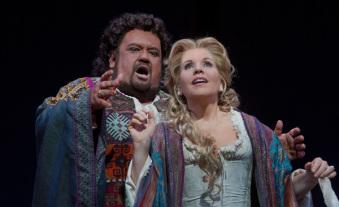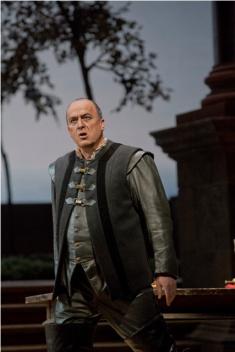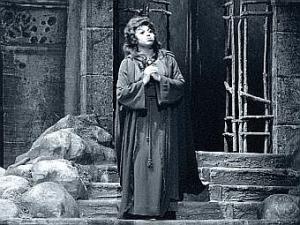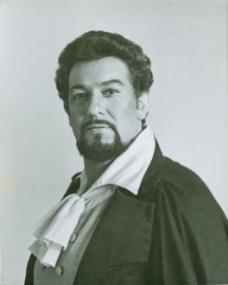This year marks the two-hundredth anniversary of the birth of Giuseppe Verdi, the reigning king of Italian opera and the acknowledged grand master of the genre no opera house can do without.
With that in mind, the Metropolitan Opera has been celebrating the occasion with a festival of his most cherished works, along with performances by other operatic notables such as Rossini, Donizetti, Puccini, and… Riccardo Zandonai? Now where the heck did he come from? Oh, well, you’ll read more about him a little later, but first let’s move on to the main attractions.
Otello Live in HD: “I Like Not That”

Johan Botha & Renee Fleming in Otello (Met Opera)
The other day I was talking to a producer friend of mine from New York City, who was telling me about the possibility of bringing Shakespeare’s Othello back to Broadway. “It hasn’t been seen there in over 30 years,” he told me. “Yes, indeed,” was my response, “and I remember the last time it was done. It was at the Winter Garden Theater in the early 1980s.”
Next, I proceeded to remind my friend that the cast back then included the likes of James Earl Jones as Othello, Dianne Wiest as Desdemona, and Christopher Plummer as Iago. “Jones was good,” I recalled, “with that imposing voice and daunting frame, but Plummer ran rings around him in the acting department.”
When, in October 2012, the Metropolitan Opera revived the Elijah Moshinsky production of Verdi’s next to last work Otello, in homage to one of the greatest opera composers who ever lived, wouldn’t you know the exact same thing happened: the Iago ran rings around the Otello, which I myself haven’t seen in over 30 years of opera viewing as well.
I got to see the Live in HD re-transmission of Giuseppe Verdi’s masterpiece on the same day (March 2, 2013) as the impressive live broadcast of Wagner’s Parsifal was aired. How I wish I could say that Otello was equally as impressive (and how I love this work!), but unfortunately I can’t. It wasn’t a total disaster, mind you, what with Renée Fleming’s regal bearing as Desdemona and Michael Fabiano’s passionately felt Cassio. Semyon Bychkov was the so-so conductor, and South African tenor, Johan Botha, whose own massively rotund form could give Jones a run for his money, was the Moorish general Otello.
But the real “hero” of the proceedings was unquestionably German baritone Falk Struckmann as Iago. A veteran of past Wagnerian ventures (he had previously sung Wotan in Harry Kupfer’s revised Ring of the Nibelung cycle in Barcelona, as well as Don Pizarro in Beethoven’s Fidelio at the Met), Struckmann’s voice and figure so dominated the Met Opera stage, and the other participants, that Verdi’s original intention of naming this masterwork after the villainous ensign began to take hold.

Falk Struckmann as Iago (Met Opera)
The insinuatingly vicious nature of this fearsome beast was brought out in remarkably subtle ways, with his revealing (and not so revealing) facial expressions among them. Struckmann’s masterful “Credo,” with his long-held high note and disdainful delivery of the line “E vecchia folla il ciel” (“And heaven is an old wive’s tale”), was greeted with huge shouts of approval, something I haven’t heard in this scene in many a year.
It was a pleasure to see and hear a real baritone for a change in this part, so often taken in the past by pushed-up basses, many of who either dodged or gave short shrift to these high-lying passages. Earlier in Act I, Struckmann savored those same high notes with a deliciously swaggering account of the “Brindisi,” helped along by the newly re-worked choreography for this revival, which added much dramatic flair to what can be a rather static episode.
Botha’s lumbering, pop-eyed Otello, already a known quantity from previous seasons, was passively sung and indifferently interpreted. There wasn’t much outpouring of grief in his traversal of one of opera’s most tragic creations, or much excitement either. Botha has been better in Wagner, of all things, and his wonderfully communicative Walther von Stolzing in Die Meistersinger is a good example of a role fitting the confines and limitations of the singer. Here, one realized that Otello simply does not suit this tenor’s temperament. The same problem existed with Canadian Ben Heppner, an otherwise excellent artist in Tristan und Isolde, but totally at sea when it comes to such roles as Giordano’s Andrea Chénier or Puccini’s Prince Calàf in Turandot. The same arguments I made over Deborah Voigt’s assumption of Italian roles hold doubly true for both Botha and Heppner: avoid them at all costs and proceed with a good degree of caution.
Fleming was her old reliable self as Desdemona, and that’s not necessarily a bad thing. However, I find her take on this and other Italian soprano parts a bit too tepid for my taste. Not that she ever sings badly – she doesn’t; it’s just that there’s no warmth there. She reminds me of the overly cautious Dame Kiri Te Kanawa, whose last-minute substitution as Desdemona back in the 1970s I was privileged to hear on the radio, opposite the emotionally thrilling Otello of Jon Vickers, another Canadian artist. Whatever happened to Te Kanawa’s promise? I couldn’t tell you. The same issues hound Fleming, in my view: a perfectly solid voice, with a velvety tone and lovely stage deportment, especially in Strauss – but as cold as a three-day old mackerel in comparison to the blood-and-guts Iago, or the lively Cassio of the young Fabiano. There’s something about Fleming’s cool air of detachment, of being above it all, that continues to nag at me.
The rest of the ensemble performed dutifully but without much vigor, and the conducting left little doubt that this revival was as misbegotten and ill-timed an affair as they come. Considering that Botha was coming off a recent bout of the flu, which affected numerous cast members of other works at the Met this winter, I for one was perfectly willing to see a cancellation rather than go through this lame excuse for a performance. Maybe I’m being a might harsh, but at these prices I think Met audiences are entitled to one hundred percent (if not more) of an artist’s efforts.
La Forza del Destino: A Real Golden Age Rabble-Rouser

Leontyne Price as Leonora (www.vpr.net)
All the snap, crackle and pop missing from Bychkov’s flaccid reading of Otello was more than present in the young James Levine’s handling of the score for Verdi’s La Forza del Destino (“The Force of Destiny”), a re-broadcast from the Met Opera archives, heard on March 23.
Originally aired in 1977, the opera starred the legendary Leontyne Price as Leonora, tenor Placido Domingo as Don Alvaro, Cornell MacNeil as Don Carlo, Rosalind Elias as Preziosilla, Martti Talvela as Padre Guardiano, and Renato Capecchi as Fra Melitone. Riveting from start to finish, maestro Levine certainly whipped the Met Orchestra into splendid shape for the overture and the rest of the performance, keeping tautness and tension, as well as a fine line throughout this rambling work.
Price’s peerless high notes and that marvelous long soprano line served her well as Leonora. The emotional content of the role was paramount; the clarity of her tone, along with the beauty of her lyrical singing, was there as I remembered it. Outside of some hollowness in her lowest notes and in her scene with Talvela’s grandly eloquent Guardiano, this was Golden Age singing at its finest. Interesting how Price’s character disappears from the story for long stretches at a time, only to reemerge in Act IV to give an incredibly spacious and penetrating account of “Pace, pace, mio Dio,” to a rousing welcome.

Placido Domingo as Don Alvaro (Louis Melancon)
The young Placido Domingo showed his youthful form in a vigorous traversal of Don Alvaro. He was eloquent, ardent, and thoughtful to his leading lady, the honeyed sweetness of his voice coming through loud and clear. Placido could give a vocal lesson or two to Botha or many other tenors around today. He almost came to grief, however, near the end of Alvaro’s strenuous Act III solo, “O tu che in senno agli angeli,” by choking a bit on the treacherous tessitura. Few tenors can manage this tricky passage comfortably, although I always marveled at the way the late Richard Tucker handled it, with his full-throated outpourings and catch-in-the-throat vocalism. Domingo recovered in time to finish the piece and went on to a fine conclusion.
His baritone counterpart, Cornell MacNeil, was nearing the last decade of an illustrious Met career. Here, he gave Don Carlo a solid, characterful villainy, with clear, always intelligible Italian diction and blazing high notes when called for. I did notice, though, that MacNeil sounded tired toward the end, until the roof-raising last duet with Domingo, the famous “Invano, Alvaro,” which never fails to raise the rafters and get an audience on their feet. MacNeil continued to sing until the late 1980s, as we shall read further on when we get to Zandonai’s Francesca da Rimini.
On the lower end of the scale, Martti Talvela lent a solid air of authority as Padre Guardiano, with firmness of line and low notes to match. There’s a close kinship in this role with Verdi’s later High Priest Ramfis in Aida, most notably in that opera’s Judgment Scene. What did Verdi know of Egyptian high priests? Practically nothing, but he knew a great deal about Italian ones, having written for the church in his early youth. This was reflected in the lovely hymn-like theme he adopted for “La Vergine degli Angeli,” which so closely resembles Schubert’s “Ave Maria.” Renato Capecchi’s cacophonous Fra Melitone was a joy to listen to, his Italian nimble and pointed as only a native-born artist can produce. He appeared in many comic parts throughout his life, including Dulcamara and Dr. Bartolo, and had sung the serious baritone repertory early in his career as well. As Melitone, Capecchi proved that one can’t take this boisterous fellow too seriously. It was Verdi’s dry run for his later Falstaff.
Other Met comprimario stalwarts, such as Rosalind Elias, Andrea Velis, Carlotta Ordassy, Andrij Dobriansky, Malcolm Smith and the ever dependable Robert Goodloe, were all there, just as memorable as I recalled them. It was a most nostalgic re-broadcast of a time when the Met was on the cusp of becoming a major international theater again after too many years in limbo. At least Forza gave radio listeners and the paying audience something to cheer about, which is more than one could say about the lackluster Otello above.
(To be continued…)
Copyright © 2013 by Josmar F. Lopes

